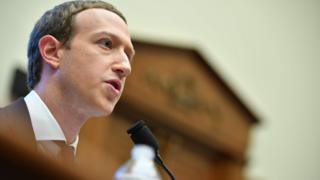 Image copyright
Image copyright
AFP
Facebook CEO Mark Zuckerberg has tried to reassure sceptical US lawmakers over the safety of the social network’s proposed digital currency Libra.
At a fractious hearing in Washington, members of Congress attacked plans for the payment system, warning it could be abused by criminals and terrorists.
Mr Zuckerberg was also challenged over claims that he had lied to US regulators in the past.
But he promised Libra would not be launched without government approval.
He said Facebook would leave the Libra Association if the consortium tried to launch a crypto-currency without the permission of US regulators.
What are the concerns about Libra?
Mr Zuckerberg’s appearance before the House Committee on Financial Services comes after a tough month for the Libra project.
Eight of the 28 founding members of the Libra Association – set up to independently govern the currency – have pulled out. They included Mastercard, Visa, eBay and PayPal.
Meanwhile, regulators around the world continue to express concern about the project. The G7 group of nations has vowed to block it unless Facebook can prove it is safe and secure.
There are concerns the currency could be used for money laundering, disrupt the global financial system, or give Facebook too much control over user data.
How did Zuckerberg respond?
He told the hearing that he understood the reservations about Libra but was determined to persevere.
“I get that I’m not the ideal messenger for this right now. We’ve faced a lot of issues over the past few years and I’m sure there are a lot of people who wish it were anyone but Facebook that was helping to propose this,” he said.
Image copyright
EPA
Ms Waters said Facebook had many “deficiencies and failures”
“But there is a reason we care about this and that’s because Facebook is about putting power into people’s hands.”
He said Libra was a prime example of “American innovation” and could help more than a billion adults without a bank account worldwide.
Facebook would not control the Libra Association and would instead occupy one seat on a governing board of five, he added.
Grilling or roasting?
As is often the case when Mark Zuckerberg is in Congress, the agenda deviates from the subject at hand.
One exchange stood out, and it wasn’t about Libra. Ann Wagner, a Republican congresswoman for Missouri, said that Facebook’s plan to introduce end-to-end encryption on its Messenger app would make it harder for authorities to discover instances of images of child sexual abuse being shared.
That matters: 12 million such images were shared on Facebook last year. It appears to be by far the biggest platform for that kind of illegal material sharing.
While other services, like WhatsApp and Apple’s iMessage, are encrypted, experts in child safety say the main Facebook platform is of greater concern when it comes to paedophiles searching for, finding, and grooming children – all on the same platform.
“What are you doing to shut this down?” Ms Wagner demanded to know.
Mr Zuckerberg cited tools developed by Facebook to detect the material, but eventually admitted: “It will be harder to find some of this behaviour.”
He’ll need to find better answers – or face a scandal that may well dwarf all the others.
What did other panel members say?
Mr Zuckerberg’s testimony was largely met with scepticism as members of Congress focused on the social network’s past failings in areas such as data protection.
Maxine Waters, the Democratic chairwoman of the panel, pointed out that the social network was the subject of an antitrust investigation. She said it had “allowed” Russia to interfere with the US election in 2016.
It had “huge” reach, with an audience of 2.7 billion users, she said, adding: “Perhaps you feel you are above the law?”
She said it would be “beneficial for all if Facebook concentrates on addressing its many existing deficiencies and failures before proceeding any further on the Libra project”.
Mr Mr Zuckerberg was also challenged over the Cambridge Analytica scandal, the spread of hate speech on Facebook, and the firm’s policy not to fact check political ads.
His personal integrity also came in for scrutiny, with Republican Madeleine Dean saying: “We earn credibility drop by drop, but we pour it away in buckets.”
Some however defended the Facebook boss’s track record as an entrepreneur.
“I have my own qualms about Facebook and Libra and the shortcomings of Big Tech,” said Representative Patrick McHenry, the top Republican on the panel. “But if history has taught us anything, it’s better to be on the side of American innovation.”
Facebook’s Zuckerberg grilled over Libra currency plan

